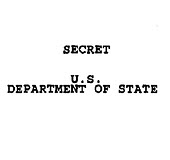At Democracy Now, Amy Goodman recently interviewed Michael Hastings, who authored the extensive article the resulted in President Obama’s firing of General McChrystal. In that interview, Hastings urged the audience to take the time to read cables by U.S. Ambassador to Afghanistan, which were leaked to the New York Times:
AMY GOODMAN: Let’s talk about Karl Eikenberry. This is a significant split between McChrystal and the ambassador, also a general or retired general, Ambassador Eikenberry, and the cables that he sent that Dan Ellsberg has called the new Pentagon Papers that he sent to Hillary Clinton but were leaked.
MICHAEL HASTINGS: I think this is the most fascinating development and the guy whose job is sort of the most in the balance right now is Ambassador Eikenberry, because it’s known as General McChrystal’s strategy, but guess who was also writing that strategy? General Petraeus. It was a devastating critique. I recommend anyone to go back and read those cables to see probably what was the most prescient and scathing critique of the strategy we’re pursuing and the leak angered McChrystal’s team beyond belief.
You can read those cables at this web page of the New York Times, along with this further description by the NYT. Ambassador Eikenberry‘s comments constitute a blistering and candid criticism of the policy the United States continues to pursue:
In November 2009, Karl W. Eikenberry, the United States ambassador to Afghanistan and retired Army lieutenant general, sent two classified cables to his superiors in which he offered his assessment of the proposed U.S. strategy in Afghanistan. While the broad outlines of Mr. Eikenberry’s cables were leaked soon after he sent them, the complete cables, obtained recently by The New York Times, show just how strongly the current ambassador feels about President Hamid Karzai and the Afghan government, the state of its military, and the chances that a troop buildup will actually hurt the war effort by making the Karzai government too dependent on the United States.
The New York Times reported on these leaked cables on January 25, 2010.

